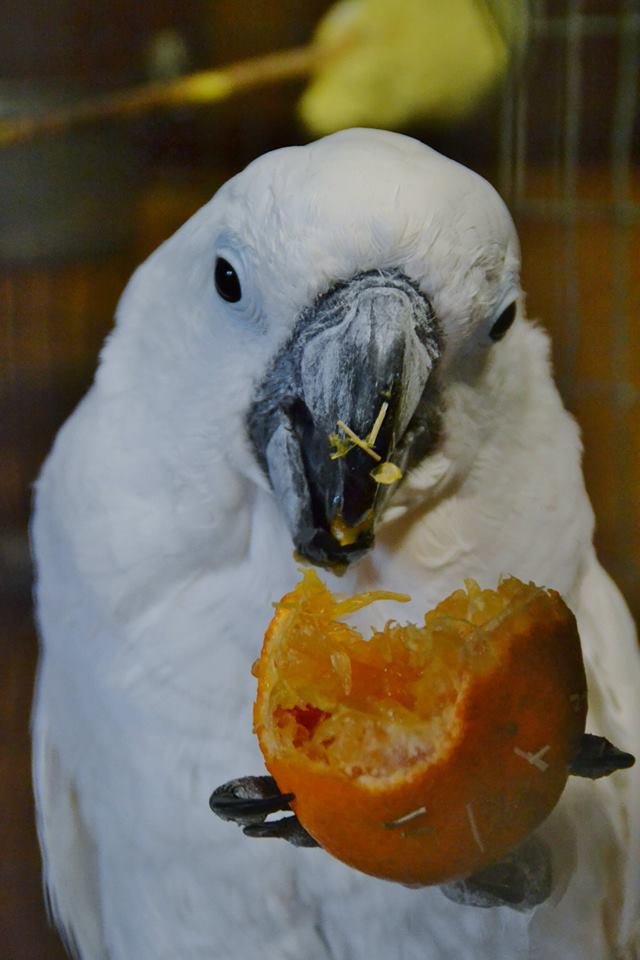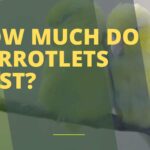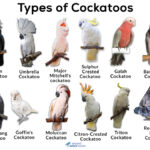Code: BD512CD
Cockatoos primarily eat seeds, nuts, fruits, berries, and leaf buds. In captivity, they also enjoy a diet of pellets, vegetables, and occasional protein.
Cockatoos, with their distinctive crests and varied personalities, are charismatic birds favored by pet enthusiasts around the world. They thrive on a diet rich in diversity, mirroring the nutritional variety found in their native habitats. Nuts, an integral part of their diet, offer essential fats, while seeds provide vital nutrients.
Fruits and berries contribute to a balanced diet with their vitamin content, and leaf buds present beneficial fiber. Captive birds often benefit from specially formulated pellets which are designed to meet all their nutritional needs. Alongside these, vegetables are a great source of minerals and are relished by these birds. A well-fed cockatoo is a happy and healthy companion, requiring a balanced diet that is as complex as the bird itself. Ensuring their dietary needs are met is crucial for their well-being and longevity.

Credit: www.newscientist.com
Cockatoos At A Glance
Imagine a bird with a flamboyant crest, a knack for mimicry, and an appetite as varied as its colors. This is the intriguing world of cockatoos, fascinating birds that captivate with their vibrant personalities and striking appearance. What do these beautiful creatures feast on? Let’s explore their diet alongside their biology and habitats.
The Biology Of Cockatoos
Cockatoos stand out with their distinctive crests and curved beaks. These features are not just for show; they play a key role in their eating habits. The beak acts like a powerful tool to crack open hard nuts and seeds, their main diet. Here, we dive into what makes a cockatoo’s biology perfectly suited for its dietary needs.
- Strong beaks for breaking into tough shells.
- Zygodactyl feet allow adept handling of food items.
- Varying tongue textures help manipulate different food types.
Habitats And Distribution
Cockatoos are not just limited to one locale; their habitats range from rainforests to urban areas. Their adaptability sees them thrive in diverse climates, from the warm tropics of Indonesia to the cooler regions of Australia. This adaptability extends to their diet as well, where they make the most of the local fauna and flora.
| Region | Habitat Type | Common Foods |
|---|---|---|
| Australia | Bushlands & forests | Nuts, seeds, berries |
| Indonesia | Rainforests | Fruits, insects, flowers |
| Papua New Guinea | Mountainous areas | Roots, leaves, small animals |
Diversity In Diet: What Cockatoos Consume
Cockatoos are not just captivating with their flamboyant crests and endearing personalities. Their diets are equally intriguing. Knowing what these birds feast on enhances our understanding of their nutritional needs and natural habits.
Natural Diet In The Wild
In their native habitats, cockatoos display a varied diet. They forage for food, and what they eat depends on their surroundings and the season.
- Fruits: A mix of native berries and orchard fruits.
- Vegetables: Leafy greens and other available veggies.
- Insects: Protein-rich nutrition.
- Flowers: Certain blooms are edible treats.
Variety Of Seeds And Nuts
Seeds and nuts are staples for cockatoos.
| Type | Description |
|---|---|
| Seeds | From grasses, shrubs, and trees. |
| Nuts | High-energy, like walnuts and almonds. |
Their strong beaks are perfect for cracking open hard shells to access the nutritious kernels inside. In captivity, their diet includes a balanced seed mixture and commercial pellets, specifically designed to meet their nutritional needs.
Fruits And Vegetables: A Healthy Addition
Fresh fruits and vegetables are vital for cockatoos. They provide essential nutrients not found in seeds or pellets. A varied diet ensures a happy, healthy bird. Let’s explore what these colorful friends love to munch on!
Favorite Fruits
Favorite Fruits
Cockatoos are fans of sweet treats in their diet. Offering a range of fruits can brighten their feeding time. Here are some to keep in the list:
- Apples: A crunchy snack (without seeds).
- Bananas: Easy to eat and soft.
- Berries: Small and full of vitamins.
- Oranges: Juicy and packed with vitamin C.
Vegetables to Include
Vegetables To Include
Veggies are equally important. They provide texture and variety. Make sure to wash them well. Here’s what to feed:
| Vegetable | Benefits |
|---|---|
| Carrots | High in beta-carotene for vision. |
| Spinach | Iron-packed for blood health. |
| Broccoli | Rich in fiber and vitamins. |
| Sweet Potatoes | Nutrient-dense and flavorful. |
Protein: A Crucial Dietary Component
Cockatoos need protein for a healthy life. It helps their feathers stay vibrant and supports overall health. In the wild, these birds find proteins from various sources. Pet cockatoos also need the right amount of protein in their diet. This can come from different foods, like animal proteins or plant-based options like legumes and pulses.
Animal Proteins: To Give Or Not To Give?
Animal proteins can be part of a cockatoo’s diet. Some examples include:
- Insects – like mealworms and crickets
- Cooked meats – occasional treats, such as chicken
- Eggs – hard-boiled or scrambled as a protein boost
Yet, give animal proteins in small amounts. Too much can lead to health problems. Always remove any uneaten meats after a couple of hours to prevent spoiling.
Legumes And Pulses
Legumes and pulses are great plant-based protein sources. Include these in your cockatoo’s diet:
- Beans – like chickpeas, black beans, and lentils
- Peas – a tasty and nutritious treat
- Alfalfa – sprouts are a crunchy food they may enjoy
Soak or cook these to make them easy to eat. This helps ensure your cockatoo digests them well. Mixing legumes and pulses with their usual food introduces variety and keeps meals exciting.
Toxic Foods To Avoid
When caring for a cockatoo, knowing what toxic foods to avoid is vital. These birds may be curious eaters, but some foods can be very harmful to them. Let’s explore what not to feed your feathered friend.
Common Household Hazards
Our homes often contain hidden dangers for cockatoos. A seemingly harmless meal can turn toxic. Be aware and keep these items away from your bird:
- Chocolate: Contains theobromine harmful to cockatoos.
- Avocado: Can cause heart problems in birds.
- Onion and Garlic: Toxic in large quantities; can lead to anemia.
- Alcohol: Even small amounts are dangerous.
- Caffeine: Can induce heart palpitations.
- Salt: Excess salt can be deadly.
- Xylitol: An artificial sweetener that’s toxic to birds.
Unsafe Fruits And Seeds
Some fruits and seeds may seem natural, yet not all are safe for cockatoos:
| Fruit | Reason for Concern |
|---|---|
| Apple Seeds | Contain cyanide, which is poisonous. |
| Cherry Pits | Like apple seeds, these can be toxic. |
| Stone Fruit Pits | Peaches, plums, and apricots should be avoided. |
| Tomato Leaves | Contains compounds that can be harmful. |
Remember to always research before sharing your snack with your cockatoo. Safety comes first!

Credit: www.inaturalist.org
Feeding Cockatoos In Captivity
Keeping a cockatoo healthy and happy requires the right diet. Let’s dive into how to feed your feathered friend properly.
Balanced Diet For Pet Cockatoos
Cockatoos need a variety of foods to meet their nutritional needs. A balanced diet includes:
- Pellets: Should make up about 50% of their diet. Select high-quality pellets that are made for parrots.
- Fresh fruits and vegetables: Provide essential vitamins and moisture. Offer daily, making up 20-25% of their diet.
- Grains and legumes: Include cooked brown rice, quinoa, and beans for added protein.
- Seeds and nuts: Give sparingly as treats because they are high in fat.
- Water: Fresh, clean water must be available at all times.
Supplements And Vitamins
Some cockatoos may need extra nutrients. Here are common supplements:
| Vitamin/Supplement | Benefit | Source |
|---|---|---|
| Calcium | Strong bones | Cuttlebone, calcium blocks |
| Vitamin A | Good vision | Carrots, sweet potatoes |
| Vitamin D3 | Calcium absorption | Sunlight, supplements |
Consult a vet before adding supplements to prevent overdose.
Hydration And Health
As with all creatures, water is a key to a cockatoo’s health. These brilliant birds need both good food and plenty of clean water to thrive. In the wild, cockatoos may find water in streams and raindrops on leaves. In our homes, it’s our job to provide them with what they need. Let’s explore the crucial role water plays in a cockatoo’s diet and how to spot signs that they might not be drinking enough.
Water Requirements
Cockatoos must have access to fresh water always. Changing their water daily is vital for their health. The amount they drink can vary based on their diet. Birds that eat more fresh food may drink less, as they get hydration from their food.
Signs Of Dehydration
Monitoring a cockatoo’s hydration is a preventive step to keep them healthy. Look out for these signs of dehydration:
- Dry or sticky mouth
- Sunken eyes
- Excessive sleepiness
- Fluffed-up feathers
- Lack of droppings, which indicates less food and water intake
If a cockatoo shows these signs, act quickly to provide water and consult a vet.

Credit: www.wikihow.com
Monitoring Cockatoo Diets And Health
Keeping your cockatoo healthy begins with what it eats. Your feathery friend’s nutrition directly impacts its well-being. Proper diet monitoring ensures your bird thrives and enjoys a vibrant life. Let’s dive into regular check-ups and spotting nutritional deficiencies.
Regular Check-ups
Regular Check-ups
Consistent veterinary visits are crucial. These check-ups help catch issues early. Vets can assess your cockatoo’s health and suggest diet adjustments if needed. Remember, prevention is better than cure. Make vet appointments part of your routine.
- Annual physical exams
- Dietary evaluations
- Weight tracking
Recognizing Nutritional Deficiencies
Recognizing Nutritional Deficiencies
A healthy cockatoo should have bright eyes, smooth feathers, and be full of energy. Signs of nutritional deficits include fatigue, plucked feathers, or beak issues. If you notice these, consult your vet.
| Vitamin | Deficiency Signs |
|---|---|
| A | Weak immunity, skin issues |
| B | Nerve problems, growth issues |
| D | Bone weakness, calcium issues |
| E | Reproductive problems |
Observe your cockatoo’s eating habits. Ensure a balanced diet:
- Fresh fruits and vegetables
- High-quality pellets
- Occasional nuts as treats
Maintain a feeding schedule. Adjust portions according to your cockatoo’s size, age, and activity level. Clean, fresh water should always be available.
Conclusion
Understanding a cockatoo’s diet is crucial for their health and happiness. A mix of seeds, fruits, vegetables, and proteins ensures these vibrant birds thrive. Remember, variety is the key to a balanced diet. Keep their meals diverse and watch your feathered friends flourish with vigor and vitality.
Ryan Everhart is a passionate bird enthusiast and blogger, primarily writing on his website, Avian Whispers. His journey into the world of bird blogging began with a deep interest in parrots, a species that captivated his attention for their intelligence and social behavior. Over time, his content expanded to cover a broader range of bird species, offering insights into bird behavior, care, habitats, and conservation.
Ryan is dedicated to educating his audience, which includes both new bird owners and seasoned enthusiasts. His writing is filled with personal experiences, expert knowledge, and practical advice on bird care. Through Avian Whispers, he aims to foster a deeper appreciation for birds, emphasizing their role in nature and the joys of having them as pets.
Starting with articles focused on parrots, Ryan’s work now encompasses a diverse range of topics such as feeding, training, habitat enrichment, and bird health. His love for birds extends beyond parrots, diving into various avian species. His informative and heartfelt writing reflects his commitment to the well-being of birds and the desire to help others connect with these creatures.
As a growing voice in the bird blogging community, Ryan strives to provide a platform where bird lovers can learn, share experiences, and connect over a shared passion for avian life. His blogs are not only educational but also serve as a reminder of the importance of protecting and nurturing the bond between humans and birds.




